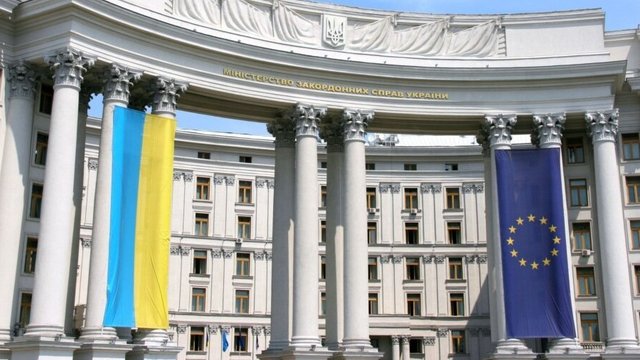EC's decision on Crimea is part of intl community's response to Russia's criminal actions against Ukraine

The Ministry of Foreign Affairs of Ukraine has said that the decision of the Committee of Ministers of the Council of Europe on the situation in Crimea and the city of Sevastopol (Ukraine) is a serious contribution of the Council of Europe to ensuring democratic security in Europe.
"We consider the decision of the Committee of Ministers as one of the elements of the complex response of the international community to the criminal actions of the Russian Federation in Ukraine. This decision undoubtedly strengthens the position on Crimea expressed last year in the UNGA Resolution 71/205 "The Situation of Human Rights in the Autonomous Republic of Crimea and the city of Sevastopol (Ukraine)" and joins the Council of Europe to the implementation of this resolution," the Ukrainian Foreign Ministry said in a statement released on Wednesday night.
The Foreign Ministry also believes that the adopted document is "one of the Council of Europe's serious contributions to ensuring democratic security in Europe and upholding the fundamental values and principles of the Organization - the protection of human rights, democracy and the rule of law."
The commentary says that on May 3, the EC's Committee of Ministers adopted a decision on the situation in Crimea and the city of Sevastopol (Ukraine), which was the first comprehensive document of the main governing body of the Council of Europe devoted to the purely Crimean issues.
In it, in particular, the Committee of Ministers once again confirmed the unchanged position regarding the independence, sovereignty and territorial integrity of Ukraine within the internationally recognized borders.
Condemning the illegal annexation by the Russian Federation of the Autonomous Republic of Crimea and the city of Sevastopol, which undermines peace and democratic security in Europe, the Council of Europe's Committee of Ministers once again stressed that such an act on the part of the Russian Federation is a violation of international law.
"It is important that the Committee of Ministers of the Council of Europe, like the UN General Assembly earlier, recognized Russia's responsibility in accordance with international humanitarian law and international human rights law and urged the Russian authorities to fulfill their obligations to the full," the Ukrainian Foreign Ministry said.
Along with such violations of human rights as the restriction of freedom of speech and peaceful assembly, freedom of religion and belief, the decision includes repressions against national minorities, in particular, Crimean Tatars. The decision of the so-called Supreme Court in the occupied Crimea to recognize the Mejlis of the Crimean Tatar people as an extremist organization and the ban on its activities also caused a condemnation of the Committee of Ministers.
"So, the document contains a clear requirement to the Russian Federation to take all measures to ensure human rights in Crimea, including viewing the injunction of the Mejlis," the Ministry of Foreign Affairs of Ukraine said.
One of the central provisions of this decision is the call for unimpeded access to the human rights mechanisms of the Council of Europe, in particular its Commissioner for Human Rights, to the temporarily occupied peninsula to monitor human rights compliance in accordance with their mandate.
"We believe that the presence of international convention and institutional monitoring bodies in the territory of the occupied Crimea in a rapidly degrading situation with human rights is vitally important and urgent," the Ukrainian Foreign Ministry said.
In this context, Ukrainian diplomats emphasize that it is important to call on the Council of Europe Commissioner for Human Rights, which for today is the only international institution that made a monitoring visit to the territory of the temporarily occupied Crimea in September 2014, to continue monitoring the situation on the peninsula.
Earlier, President of Ukraine Petro Poroshenko welcomed the adoption by the Committee of Ministers of the Council of Europe of a comprehensive decision in connection with the situation in Crimea occupied by Russia in 2014 and called it "a confirmation of the inevitability of Russia's responsibility."









